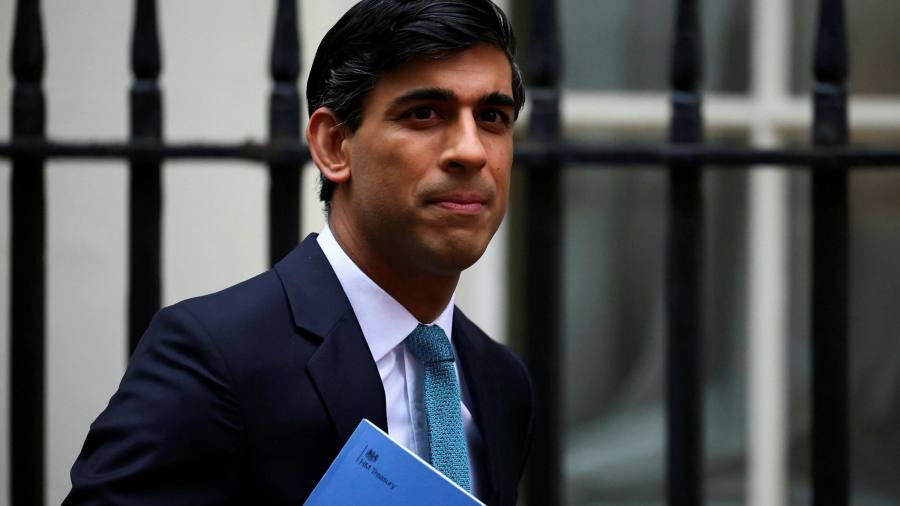[ad_1]
On March 3, Rishi Sunak, UK chancellor, will present a Budget. I have no idea what he will say. But it is clear what he should say.
It is far too soon to detail the fiscal adjustment that will eventually be needed in the aftermath of Covid-19 and Brexit. The economy has too uncertain a future and will continue to need robust fiscal support. Sunak must show he understands this. But what he also must do is prepare the ground for coming tax rises — and the tax reforms that should accompany them.
The Office for Budget Responsibility’s central case last November was for a jump of 20 percentage points in the ratio of net public debt to gross domestic product between 2019-20 and 2023-24. Combined with Brexit, the pandemic will also cause a permanent reduction in real GDP, relative to prior expectations. So, in the end, there will have to be a large fiscal adjustment.

Public debt is also on a rising long-term trajectory, largely because of an ageing population. While curbs on spending may contribute to the adjustment, it is politically inconceivable that they will contribute as much as they did after the 2008 financial crisis. So, the ratio of government receipts to GDP must rise. The chancellor has to say so, whatever his party’s resistance. That is his duty. It is also not the end of the world. Many countries have higher ratios of tax receipts to GDP than the UK, as well as higher real incomes per head. Among these are Canada, Denmark, Germany, Netherlands and Sweden.

The UK tax system is such a mess that reform makes sense anyway. But it is even more urgent if the tax burden is to rise. It is time to consider who taxes, what to tax and how to tax.
Under “who taxes?†the biggest issue is the centralisation of tax-raising powers and, in particular, the negligible fiscal autonomy of local government. That needs to change, along with reform of property taxation.

Under “what to tax?â€, there is a simple hierarchy: tax “bads†and rents, and then wealth, spending and incomes. Under taxing “badsâ€, the obvious priority is environmental taxes, especially a rising tax on carbon dioxide emissions. As for rents, there are many possibilities, including taxing land values and supernormal profits. Under “how to taxâ€, there are principles of neutrality, simplicity and equity that today’s messy system violates.
Here, then, are just a few important areas of reform for consideration.
As a recent report from the Institute for Fiscal Studies argues: “There is a large, unjustified and problematic bias against employment and labour incomes and in favour of business ownership and capital incomes.†The tax treatment of returns to investment is a mess: incentives depend on the asset type, source of finance and legal structure, and range from large subsidies to large penalties. There is also a strong incentive to turn employees into self-employed and so expand the “gig economyâ€. This is bad policy.

Corporate taxation today also has a destructive bias against investment and in favour of borrowing. More fundamentally, it is hard nowadays to design a workable system based on taxing companies where they make or do things. It would be better, some argue, to tax corporations where they sell, instead. A cash flow destination tax would be more difficult to avoid and would raise more money, more easily.
There is now an increasingly vigorous discussion of wealth taxes. Yet, without going there now, the UK’s inheritance tax is an unjust lottery which burdens the heirs of the middle and upper middle classes, but not those of the rich. Taxing large lifetime receipts would be fairer and more effective.
Then there are council tax and business rates, which make up the residue of an older and more rational system of property taxation. The Fairer Share manifesto provides a compelling attack on council tax. It should be reformed, together with business rates and stamp duty, and incorporated into a system of property taxation that is less unjust and encourages new development and more efficient use of developed urban land.
Far more needs to be looked at. But the big points are clear. The UK must consider its fiscal priorities and its tax system, strategically. This has long been important. The shocks of Brexit and Covid-19 make it essential. If Sunak is to be more than another forgotten chancellor, he needs to explain the long-term realities of the UK’s fiscal position. He must also examine the opportunities for radical fiscal reform that will make today’s system less distorting economically and raise more money. Now, above all, is the time to start.
[ad_2]
Source link





